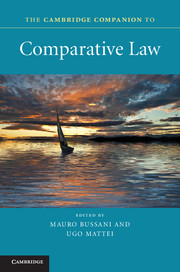Book contents
- Frontmatter
- Contents
- Contributors
- Abbreviations
- Preface
- Part I Knowing comparative law
- Part II Comparative law fields
- Part III Comparative law in the flux of civilizations
- 12 The East Asian legal tradition
- 13 The Jewish legal tradition
- 14 The Islamic legal tradition
- 15 The sub-Saharan legal tradition
- 16 The Latin American and Caribbean legal traditions
- 17 Mixed legal systems
- 18 Democracy and the Western legal tradition
- Index
- References
16 - The Latin American and Caribbean legal traditions
Repositioning Latin America and the Caribbean on the contemporary maps of comparative law
Published online by Cambridge University Press: 05 May 2013
- Frontmatter
- Contents
- Contributors
- Abbreviations
- Preface
- Part I Knowing comparative law
- Part II Comparative law fields
- Part III Comparative law in the flux of civilizations
- 12 The East Asian legal tradition
- 13 The Jewish legal tradition
- 14 The Islamic legal tradition
- 15 The sub-Saharan legal tradition
- 16 The Latin American and Caribbean legal traditions
- 17 Mixed legal systems
- 18 Democracy and the Western legal tradition
- Index
- References
Summary
The contemporary limits of Latin America and the Caribbean as a legal space
The states and jurisdictions south of the Rio Bravo (alternatively known as the ‘Rio Grande’ in the United States) form a very large historical, cultural, economic, and geographic region usually known as ‘Latin America’. Geographically speaking, these states encompass, with some exceptions that culturally belong to ‘Anglo-America’, the south-western corner of North America where a territorially diminished Mexico serves as regional borderline with the United States; most of the Central American isthmus and South America; and, finally, some island states and island colonies that sit within the waters of the Caribbean basin. By 2005, around 543 million people lived in this area of the world. It has recently become fashionable to say that the next decade, even the next century, will belong to Latin America. For pundits on the left the region stands as the remaining chance in the world for true pluralism, alternative democratic experiments, and sustainable development; with almost equal enthusiasm, businessmen and economic analysts on the right see in the region an expanding middle class that, with its entry into consumerism, will fuel global markets.
Due to demographic and economic pressures, however, around 30 million Latin Americans have migrated towards the economically central regions of the world (mainly to the United States and western Europe). In their backpacks and suitcases they have not taken with them their laws as have, for example, immigrants of Muslim persuasion. In their new milieus, Latin Americans have had to learn the trappings and requirements of what many take to be a more demanding and rigorous rule of law than the one they used to know in their homelands: many of them turn into disempowered ‘illegal aliens’, for example, who stick almost neurotically to the legal speed limit for fear that, if caught, they will not only be issued with a ticket but perhaps also deported. In situations of disempowerment and cultural disorientation, then, compliance with the law (i.e., how to become the all-important ‘law-abiding person’ or better, perhaps, the ‘authority-obeying’ individual of US culture) demands pervasive attention to detail and even to appearance. For a Latin American living in the First World, the concept of ‘jaywalking’ becomes legally and culturally meaningful for the first time.
- Type
- Chapter
- Information
- The Cambridge Companion to Comparative Law , pp. 344 - 367Publisher: Cambridge University PressPrint publication year: 2012
References
- 3
- Cited by

